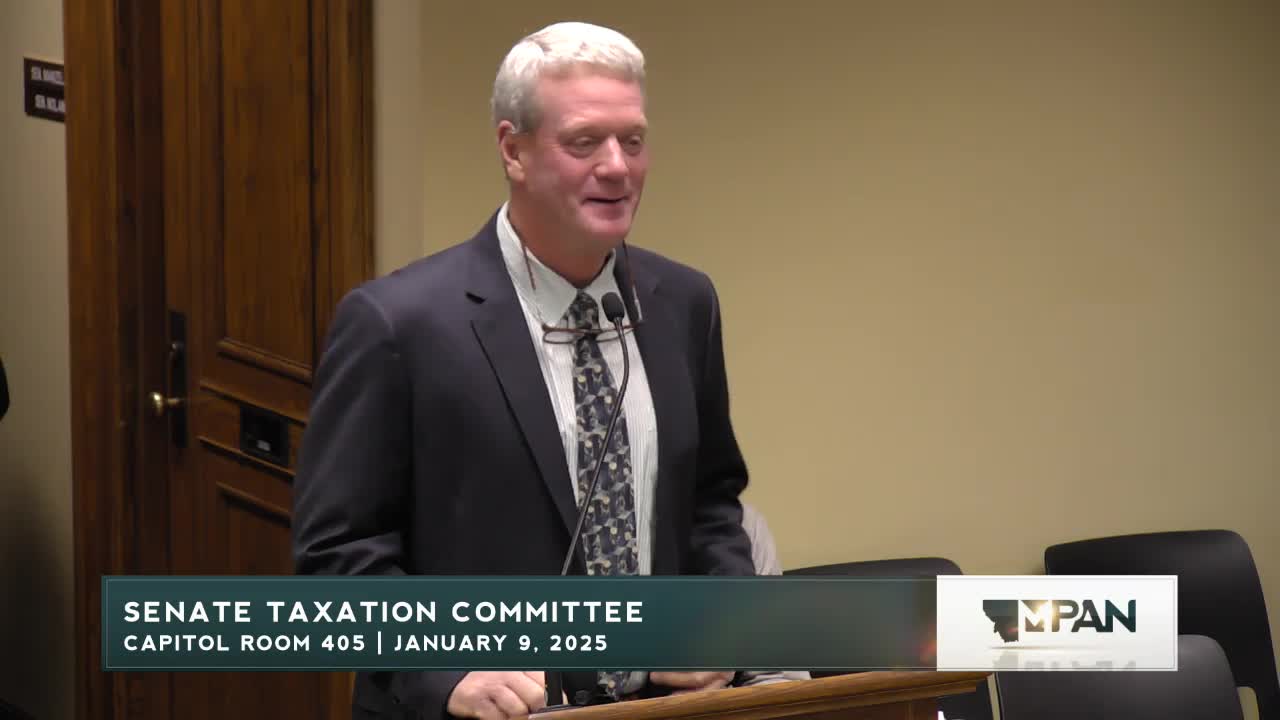Montana Department of Revenue outlines session priorities, highlights land-classification bill and property-tax outreach
Get AI-powered insights, summaries, and transcripts
Subscribe
Summary
Department of Revenue Director Bridal Beatty told the Senate Taxation Committee the agency will focus on land-classification legislation, support components of the governor's tax package, and continue broad taxpayer outreach and local office access this session.
Bridal Beatty, director of the Montana Department of Revenue, told the Senate Taxation Committee on the organizational day that the department will focus this session on a land-classification bill developed by a multi-stakeholder working group, implementation details for portions of the governor's tax package, and continued citizen outreach and service.
Why it matters: the Department of Revenue administers Montana's tax programs and property valuations; changes to land classification and property-tax implementation affect valuations, revenue distribution, and the workload of local and state staff across the state.
Beatty emphasized the department's role as an executive agency that implements the legislature's will and stressed factual, nonpartisan testimony from staff. "My view of the role of the executive branch is to execute the will of the legislature," Beatty said. He told the committee that when department staff testify, "it is correct information, it is clear, And it is not politically spun." He added, "Everything will be honest. It will be above board."
On the land-classification work, Beatty said the department chaired a land classification working group after bills from the prior session were not enacted. That group included "virtually every stakeholder you can imagine" and drafted a bill addressing how agricultural land and undeveloped tracts are treated for property-tax classification; the revenue interim committee picked up the draft for this session. Beatty said that as land use and subdivision patterns have changed, the tax code's alignment with those classifications has grown more complex and that the draft is a high-priority, high-profile item for the department.
The director also described several operational priorities and recent outreach: the department ran dozens of town halls on property tax and other topics (Beatty said his office ran 56 property-tax town halls in a prior cycle and another 26–28 events more recently), and the agency completed 77 outreach activities in 2024 across webinars and in-person events. Jill Hamilton, division administrator for Information Management and Collections, told the committee the department collects roughly $3,800,000,000 in state revenue each fiscal year and operates the taxpayer electronic services (Taxpayer Access Point).
Paula Gilbert, administrator of the Property Assessment Division, described the division's scale: PAD employs 289 people (nearly half of the Department of Revenue), values over 800,000 properties at 100% of market value per Montana Code Annotated 15-8-111, and applies 16 property-tax classes set by the legislature. Gilbert said PAD identified 20,459 properties with new construction over the 2021'2023 period (new construction can include additions), and the division maintains 30 local offices around the state for in-person service.
Beatty and staff also discussed local service access and staffing. In response to a senator's question about where constituents can speak face-to-face, Beatty confirmed there is a Department of Revenue office in Bozeman and said the department has reopened local offices in Park County (Livingston) and Townsend to restore in-person service. He noted recruiting and retention challenges in high-cost communities and that salary competition with private-sector employers affects turnover in appraisal and field offices.
On cannabis taxation, Kristen Barber, administrator of the Cannabis Control Division, and Beatty said activity and purchases have "plateaued" compared with early years; cannabis-generated revenue is roughly $60,000,000 per year (Beatty described it as "roughly 60,000,000 plus a year in revenues"). The department said it expects to appear more frequently before the committee this session as bills addressing cannabis tax rates and revenue distribution are filed.
Staff reminded legislators the department is available as a technical resource: Eric Dale (Tax Policy and Research Unit) noted the department's biennial report contains comparative tax-structure information and revenue estimates, while legal and IT staff offered to brief committee members on litigation, statutory implementation, and technology impacts for proposed bills.
The department invited members to 'lunch-and-learn' briefings on property tax and other topics over the next two weeks and offered tours of several facilities, including the liquor warehouse and processing operations. Beatty closed by urging the committee to use the department as an informational resource as bills proceed through the legislative process.
Ending: The department did not present bills for committee action at the organizational meeting but signaled the land-classification bill and elements of the governor's tax package will be priorities and that staff will provide detailed implementation assistance as proposals are drafted and heard.
